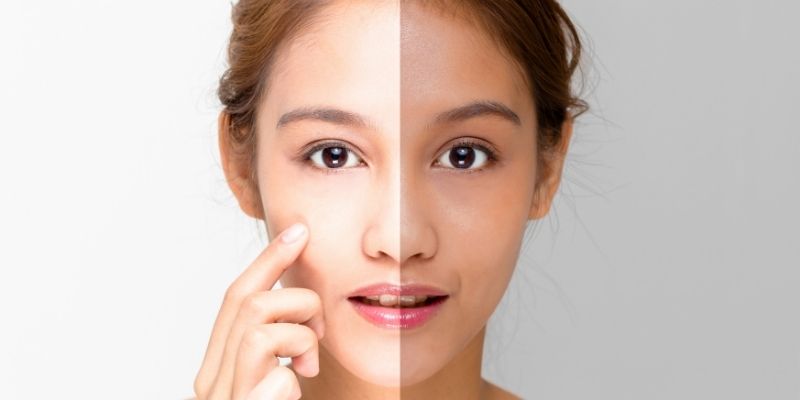Are you curious about the effects of weight loss on your complexion? Many people wonder if shedding those extra pounds can actually make their skin appear fairer. While there may be some truth to this idea, it’s important to understand the science behind it. In this post, we’ll share the relationship between weight loss and skin tone, and whether losing weight can truly make you look fairer.

Contents
Does Losing Weight Make You Fairer?
The Effects of Weight Loss on the Skin
The effects of weight loss on the skin can be positive, neutral, or even negative, depending on various factors. Here’s a breakdown of both the good and not-so-good:

Positive effects:
- Improved skin health: Losing weight can improve your overall health, which often reflects in your skin. You might experience reduced inflammation, less oily skin, and a healthier, more radiant glow.
- Reduced acne: If your acne is related to hormonal imbalances or insulin resistance, weight loss can help regulate these factors and potentially improve your acne.
- Reduced risk of skin conditions: Obesity is linked to an increased risk of certain skin conditions like eczema and psoriasis. Losing weight can lower your risk of developing these conditions or improve their symptoms.
- Increased confidence: Many people feel more confident when they lose weight and see positive changes in their appearance, including their skin.
Neutral effects:
- No change: For some people, their skin might not show any noticeable changes after weight loss. This is particularly true for those with minimal weight loss or naturally elastic skin.
Negative effects:
- Loose skin: This is the most common concern, especially after substantial weight loss. When skin stretches significantly over time, it may not retract fully after fat loss, leading to loose, sagging skin.
- Dryness and dehydration: Rapid weight loss can sometimes lead to dehydration, which can make your skin appear dry and flaky.
- Stretch marks: While these are more common during weight gain, rapid weight loss can sometimes worsen existing stretch marks or even cause new ones.
Lifestyle Factors that Can Influence Skin Tone
Here are some key factors that can influence skin tone:
1. Hydration:
Staying well-hydrated is crucial for maintaining healthy skin. Drinking an adequate amount of water throughout the day helps flush out toxins and keeps your skin hydrated and plump. Aim for at least 8 glasses of water per day to keep your skin looking fresh and glowing.
2. Balanced Diet:
Eating a balanced diet rich in vitamins, minerals, and antioxidants can work wonders for your skin tone. Include plenty of fruits, vegetables, whole grains, lean proteins, and healthy fats in your meals. These nutrient-rich foods provide the building blocks for healthy skin and promote a youthful complexion.
3. Sun Protection:
Excessive sun exposure can lead to skin damage, pigmentation, and uneven skin tone. Make it a habit to wear sunscreen with at least SPF 30 every day, even on cloudy days. Additionally, consider wearing a wide-brimmed hat and seeking shade during peak sun hours to minimize sun damage.
4. Regular Exercise:
Exercise not only benefits your overall health but also promotes healthy skin. Physical activity increases blood flow, delivering essential nutrients and oxygen to your skin cells. This helps nourish your skin and gives it a natural glow. Aim for at least 150 minutes of moderate-intensity aerobic activity per week.
5. Skin Care Routine:
Establishing a consistent skincare routine tailored to your skin type can have a significant impact on your skin tone. Cleanse, exfoliate, moisturize, and protect your skin using gentle and effective skincare products. Don’t forget to remove makeup before bed and avoid harsh ingredients that can irritate your skin.
6. Stress Management:
Chronic stress can take a toll on your skin, leading to dullness and uneven tone. Practice stress management techniques like meditation, deep breathing exercises, or engaging in activities you enjoy. Taking care of your mental well-being can positively influence your skin’s appearance.
Frequently Asked Questions
Why do I get darker when I gain weight?
Acanthosis nigricans, a sign of insulin resistance commonly found in individuals with obesity, can appear as a darker shade or discoloration of the skin. However, weight loss is often the best treatment for this condition.
What is diet face?
“Diet face” refers to the phenomenon of individuals, especially women, looking gaunt and aged after losing weight in middle age.
Does weight affect skin color?
Being overweight can contribute to skin problems like acanthosis nigricans, which causes darkened areas of the skin, and stretch marks due to skin stretching.
Does your complexion change when you lose weight?
Yes, complexion changes are common during weight loss journeys, just like plateaus and non-scale victories. It is a natural part of the process.

Hello, I’m Ravindra. Over the years, I’ve immersed myself deeply into the world of fitness and health, transforming both my body and mind. Writing has allowed me to share my journey, insights, and expertise with those just starting out and seasoned fitness enthusiasts alike. Beyond just routines and diets, I believe in inspiring others to adopt a holistic approach to well-being.

